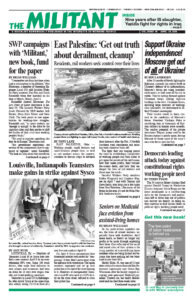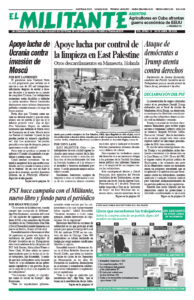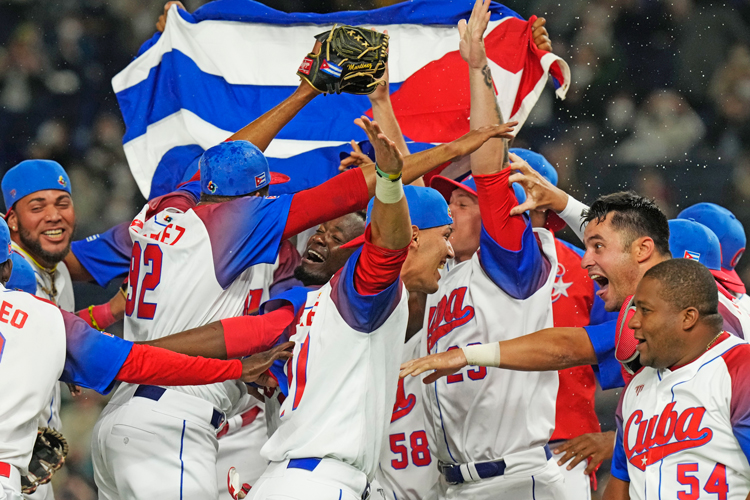For the first time since the 1959 Cuban Revolution, a baseball team representing Cuba played in Miami March 19. They were participating in the World Baseball Classic semifinals against the U.S. team. The Cuban team played with dignity in the face of repeated provocations by a small number of rightists in the crowd, while local authorities looked the other way.
The rightists were especially incensed that in another first, five of the players on the Cuban team are current or former players in Major League Baseball — as well as some from minor league teams — in the United States.
Cuba’s socialist revolution greatly expanded access for working people to art, culture and sports. Unlike in the United States, where star athletes can make millions of dollars a year, in Cuba sports is not a profit-making business and athletes play primarily for the recognition and love of the sport. But capitalist sports leagues in the U.S., seeking to boost profit margins, continuously try to lure Cuban athletes to defect to the U.S., holding out the incentive of big payouts.
Miami is home to the largest population of Cubans in the U.S., and the game was played in a stadium built on the site of the old Orange Bowl in Little Havana. “The crowd was, on the whole, on the Cuban team’s side,” the Los Angeles Times had to admit. “Fans roared during pregame introductions and after the Cuban national anthem. They exploded with each hit off a Cuban’s bat.”
Rightists — egged on by some local politicians such as Miami Mayor Francis Suarez — tried to disrupt the Cuban team and the game. A couple hundred protesters calling themselves the “Assembly of Resistance” rallied outside the ballpark, carrying banners calling the players “Traitors to Their People.”
Inside the stadium counterrevolutionaries hurled insults at Cuban players in the dugout and the outfield bullpen, calling them “murderers.”
“A video has surfaced of a handful of young game-goers throwing beer and cups at Cuban delegation officials,” the Miami Herald said.
A March 24 statement by Cuba’s Ministry of Foreign Affairs (Minrex) gave a more accurate picture of the harassment. “Objects were thrown at the players and their families — which included women, children and elderly persons — and at members of the delegation and the Cuban press corps, and at supporters of the Cuban team.”
When these attacks were reported to stadium police, “no action was taken against the offenders,” and “no attempt was made to enforce the stadium rules for maintaining order and good behavior.”
Three different times individual rightists ran onto the field. Each of the three was arrested on misdemeanor trespassing charges, then rapidly released on bond.
A U.S. State Department official told Reuters the U.S. supports “freedom of expression.”
The Cuban government had to get special permission from Washington to include the U.S.-based Cuban players on Team Asere (“Team of Brothers”), due to regulations that are part of Washington’s more than 60-year economic war on Cuba.
Cuba invited players who had emigrated from Cuba with or without visas, but did not invite players who had abandoned the Cuban national team during previous international competitions.
Major league players joining Team Asere were Yoán Moncada and Luis Robert Jr. of the Chicago White Sox; Roenis Elias of the Chicago Cubs; Yoenis Céspedes, who last played with the New York Mets in 2020; and former Los Angeles Dodger Erisbel Arruebarrena, who now lives in Cuba. They were joined by Triple-A players Andy Ibáñez of the Toledo Mud Hens, Miguel Romero with the Las Vegas Aviators and Ronald Bolaños of the Omaha Storm Chasers.
This, and the positive response to the team by the Miami fans, reflects opposition to Washington’s embargo.
Moncada told the press he was “very hopeful that this is a first step for the Cuban players that are in the major leagues to represent their country in future tournaments.”
Cuba lost the game to the U.S. by 14-2. The conduct of the U.S. team was “respectful and consistent” with sporting spirit, the Minrex said. “Its victory was well deserved.”
But “the Cuban team did not participate in the event on equal footing,” the statement noted, citing the “repeated actions of various kinds expressing hostility” as well as the “direct acts of aggression, threats, vulgar and offensive language.”
When the team returned to Cuba March 20 thousands in Havana welcomed them, cheering as they passed through the streets of the capital and then at an official ceremony at Ciudad Deportiva Coliseum. Washington made it an explicit condition for members of the Cuban team who play in the U.S. that they couldn’t travel to Cuba with their teammates after the game.
Cuban President Miguel Díaz-Canel greeted the team at José Martí International Airport. “You faced a powerful opponent with dignity, and amid a tremendous hostility promoted by haters who wanted to overshadow the sporting spectacle grotesquely and indecently,” he told the players.
Cuba’s Ministry of Foreign Affairs said the country looks forward to playing in the 2026 World Baseball Classic. “Cuba has no intention of giving up its right to complete on equal terms on U.S. soil.”


